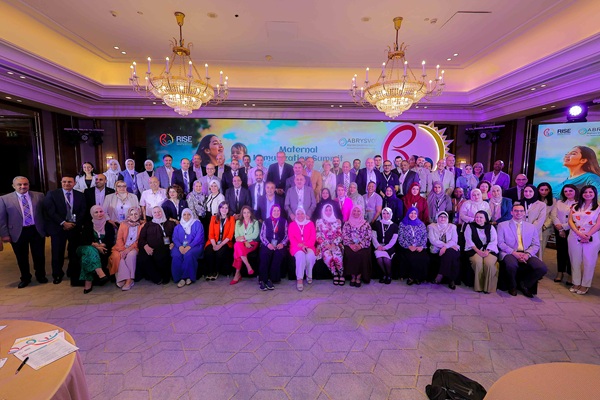|
International and
regional experts focus on
RSV prevention at Pfizer
MERA Maternal Immunization
Summit: Born Ready
(DUBAI)
-
More than 80 international
and regional healthcare
experts have convened at the
Pfizer MERA Maternal
Immunization Summit: Born
Ready to discuss issues
about maternal immunization.
The summit, entitled ‘RISE:
Respiratory Immunization
Summit for Excellence’ and
held from 16-17 May 2025 in
Cairo, Egypt, focused on the
growing burden of neonatal
respiratory syncytial virus
(RSV) and the role of
maternal vaccination in its
successful prevention.
The summit aimed to
increase awareness of the
virus and its impact, in
addition to the importance
of maternal immunization in
preventing RSV and
protecting newborns. Experts
addressed the challenges and
barriers to the adoption of
maternal vaccination, shared
best practices, and explored
how healthcare providers can
more effectively implement
maternal immunization
programs in the region.
Professor Irene Cetin,
Professor of Obstetrics and
Gynecology, University of
Milan and Head of
Obstetrics, Mangiagalli
Policlinico Hospital
Fondazione IRCCS Cà Granda,
Milan, Italy, said:
“Maternal immunization
leverages the natural
pregnancy process whereby
antibodies –
disease-fighting molecules –
pass naturally from mother
to baby through the
placenta, starting in the
second trimester and peaking
during the third. Maternal
antibodies help protect
infants at birth and during
the first few months of
life, before they are
eligible to receive
vaccinations themselves.”
The administration of a
vaccine to an expectant
mother activates the
maternal immune system,
triggering the production of
immunoglobin G (IgG)
antibodies, which pass
through the placenta from
the parental bloodstream.
Professor Mohamed
Momtaz, Emeritus Professor
of Obstetrics and
Gynecology, Kasr Al Ainy
Faculty of Medicine, Cairo
University, Cairo, Egypt,
said: “Because of the way
the placenta pumps
antibodies into the fetus
during the second and third
trimesters of pregnancy,
fetal IgG concentration
usually exceeds the
concentration of antibodies
in the maternal circulation
in full-term infants,
meaning the baby is better
protected from infectious
diseases than the mother.
This highlights the
tremendous potential of
maternal immunization to
help prevent transmission of
communicable diseases and
reduce the impact of
infections such as RSV.
Furthermore, events like
this summit encourage
evidence-based conversations
between healthcare providers
and expectant mothers, while
also highlighting practical
approaches to communication
and appropriate data
sharing.”
According
to the World Health
Organization,
RSV – a
seasonal virus that leads to
infections of the lungs and
respiratory tract – is the
most common cause of acute
lower respiratory infections
in children globally,
responsible for an estimated
33 million such infections,
more than three million
hospitalizations and almost
60,000 deaths per year in
children under 5 years of
age. This trend is reflected
regionally, where RSV
infections are the leading
cause of acute respiratory
tract infections in young
children, typically peaking
during the winter months or
the rainy season in humid
countries.
Professor
Hossam Al Tatari, Director
of General Pediatrics and
Pediatric Infectious
Diseases Services at The
Heart Medical Center, Al
Ain, UAE, said: “RSV
infection is very common,
affecting almost all
children within two years of
birth. In adults and older,
healthy children, RSV
typically produces mild
symptoms that mimic the
common cold, but in newborn
babies below 6 months, and
those otherwise
immunocompromised, such as
babies born prematurely, the
infection can prove
life-threatening. We must
explore every possible
avenue to mitigate the risks
associated with RSV, and
take every step to prevent
transmission, especially to
the most vulnerable amongst
us.”
Highlighting the
benefits of maternal
immunization to newborns and
immunocompromised infants,
Dr. Hammam Haridy, Senior
Director, Regional Medical &
Scientific Affairs at Pfizer
MERA, said: “Infections such
as RSV, while potentially
dangerous, are preventable
with vaccination. Despite
the significant impact of
RSV in the region and across
the globe, comprehensive and
consistent region-wide
surveillance and burden data
across the Middle East and
North Africa region are
currently limited. Forums
such as the Maternal
Immunization Summit are
therefore crucial to drive
buy-in of healthcare
providers to increase
awareness and tackle vaccine
hesitancy. By providing a
platform via which
stakeholders can connect and
share data and insights, we
can drive the conversation
around maternal vaccination,
ensuring we make the best
use of available data in our
interactions.”
Both
the World Health
Organization and the
Strategic Advisory Group of Experts
on Immunization (SAGE) recommend
that countries adopt
measures to prevent severe
RSV in infants, with
decisions on whether to use
maternal immunization or
monoclonal antibodies
dependent upon several
factors.
Emphasizing
the need for collaboration
between the medical
community and vaccine
developers to ensure maximum
success in prevention,
Merih
Cetinkaya, Professor of
Pediatrics, Health Sciences
University and Head of
Neonatology at Basaksehir
Cam Sakura, City Hospital,
Istanbul, Turkey, said:
“Communicable diseases such
as RSV have considerable
impact on neonatal health,
affecting both our
populations and our
healthcare systems, and
vaccinations remain a
cornerstone in lessening
this impact. As healthcare
providers, we share
responsibility with
stakeholders across the
healthcare landscape to
understand such diseases, to
leverage innovation and
technology, and to ensure
equitable access to
life-saving vaccines,
especially for the most
vulnerable members of our
communities.”
During
the event, Pfizer
underscored its ongoing
commitment to shaping the
future of public health
through the power of
vaccines. Over the years,
Pfizer’s vaccines have
played a vital role in
preventing, controlling, and
in some cases nearly
eradicating infectious
diseases, safeguarding
millions of lives around the
world and across the MERA
region. As a leader in
biopharmaceutical
innovation, the company
remains deeply invested in
research and development,
driving forward new
solutions to enhance patient
outcomes and advance global
health.
 PRINT
THIS ARTICLE
PRINT
THIS ARTICLE
|



